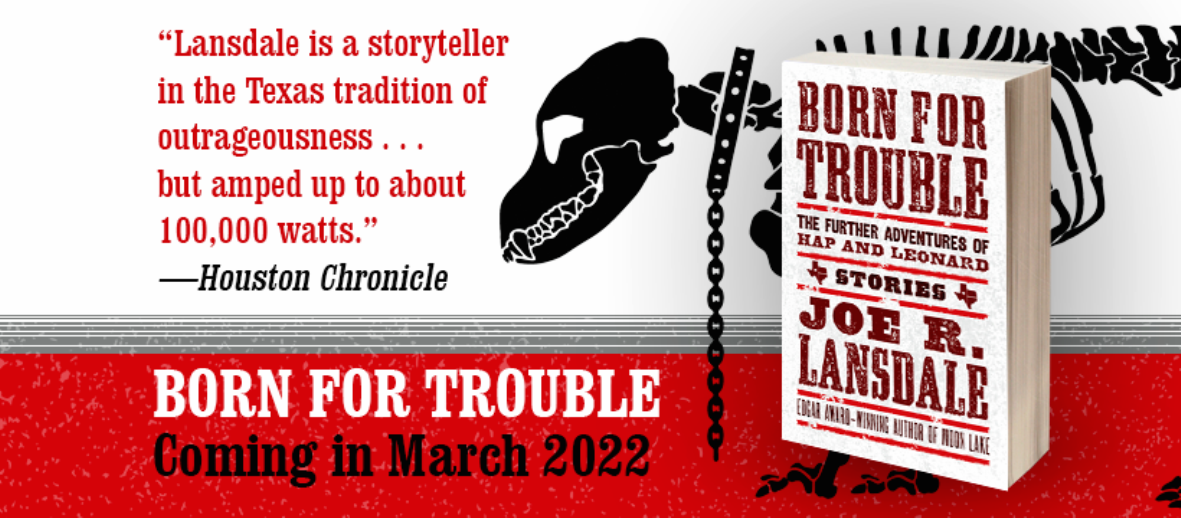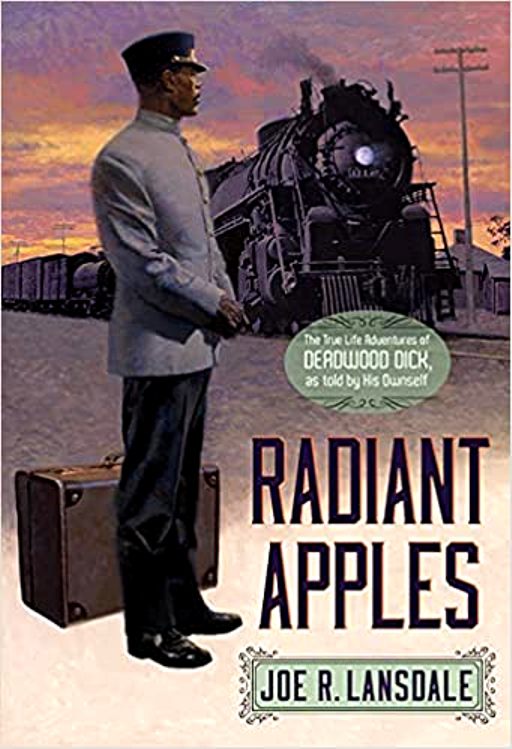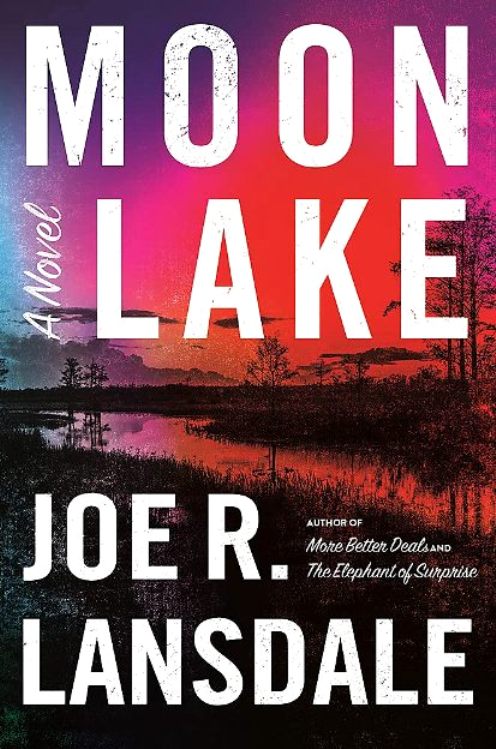
On this month's Special Page:
Joe R. Lansdale gives us new writing tips, this time techical ones
IN THE "SPECIAL PAGE" ARCHIVES:
Joel Foster
Nicholas Vince
Elizabeth Massie
Christopher Golden
Mort Castle
Josh Malerman
AN ARTICLE FROM JOE R. LANSDALE

Champion Mojo Storyteller Joe R. Lansdale has written novels and stories in many genres, including Western, horror, science fiction, mystery, and suspense. He has also written for comics as well as "Batman: The Animated Series." As of 2018, he has written 45 novels and published 30 short-story collections along with many chapbooks and comic-book adaptations. His stories have won ten Bram Stoker Awards. a British Fantasy Award, an Edgar Award, a World Horror Convention Grand Master Award, a Sugarprize, a Grinzane Cavour Prize for Literature, a Spur Award, and a Raymond Chandler Lifetime Achievement Award. He has been inducted into The Texas Literary Hall of Fame, and several of his novels have been adapted to film.
Frequent features of Lansdale's writing are usually deeply ironic, strange or absurd situations or characters, such as Elvis Presley and John F. Kennedy battling a soul-sucking Egyptian mummy in a nursing home (the plot of his Bram Stoker Award-nominated novella, Bubba Ho-Tep, which was made into a movie by Don Coscarelli). He is the winner of the British Fantasy Award, the American Horror Award, the Edgar Award, and ten Bram Stoker Awards.
His current new-release publisher is Mulholland Books. Lansdale also publishes with Dark Regions Press and Tachyon Publications, and with his daughter Kasey he has started a new publishing company called Pandi Press to control the re-issue and publishing of his older works.
You can go to his official website HERE
Joe R. Lansdale Gives Us New Writing Tips
I like to go to work with a certain excitement that gives me pleasure, and hopefully will give the same to the reader. We are not all pleased by the same thing, but if I can write for myself with joy and enthusiasm, I'm confident readers will feel that in the work and some of them will share that enthusiasm and be swept along by the story. I enjoy writing as well as having written. I enjoy finding my story as I go, figuring it out, and putting it down for myself, and no one else, with the confidence I will find some similar souls out there that enjoy the sort of tale I have told.
I still get excited when books of mine show up, and I'm apt to carry them around with me from room to room for days. This is happiness that comes from being able to do what I wanted to do for a living since I was a child and tried to write and draw my own comics. It's a good life for me.
But writing also takes discipline. Below are some technical writing tips, or at least, how I handle these areas.
How often should you make revisions? I revise daily, then halfway through, I revise from front to middle, continue on, and when finished I revise the whole book, but by then my revisions or more like a polish, and generally take very little time. Now and again I discover I have really missed the boat in a place or two, and this may require greater revision, or an editor might suggest something. I always try and take their suggestions and see if they feel right, and if they do, I make those revisions, but I generally boil down their suggestions to the minimum and then make the changes. Sometimes a paragraph, even a sentence, can address a problem and make it work far better than a dozen pages or more.
How many drafts should you make? Each writer finds their path. I do one, and then a polish. Now and again I end up doing more polish than expected, and each day I revise as I go, so how many drafts do I do daily? No idea. But in the broader sense, for me, it's one draft and a polish.
When people say, write your first draft...I'm already worried. I don't like multiple drafts or vomit pages. I'm not saying that can't work for others; just that it doesn't work for me. When I quit doing multiple drafts, I started doing better work.
How do you form a plot in your mind? I found that if I sat down to plot in a conventional manner, I would look at the ceiling, think about what was out in the yard, which books I wanted to read, and nothing developed other than boredom or some forced idea that was about as exciting as being forced to sit on and hatch a chicken egg. But, during the day, if I could learn to relax and think about anything but story, ideas would develop, and certainly at night a seed would be found. I don't immediately try and whip it into shape. I let it spill out, and after all these years my subconscious has learned to give me a story, and each day when I awake it has sorted it for me. I try to quit writing when I feel there are at least fumes in the tank, then start afresh the next day.
Should you have a set writing schedule?I try to write only about three hours a day. I stay fresh that way, and don't get so tuckered out that next day I do nothing. I set a reasonable number of pages. Three to five. I nearly always achieve that, or more. Sometimes a lot more. I let the idea flow, but I never let it turn into a vomit draft, which doesn't work for me at all, which explains the short work space daily. I polish as I go. I avoid multiple drafts, and when it's all done I do a polish. I work better that way.
Do I ever violate this? Of course. I'm a grown man. I can make decisions. Have I ever been let down by my subconscious. From time to time it will take a holiday and will fail to leave contact information. Still, there is enough residue in the house of my subconscious, I can on my worst day write a story. It may require more of my conscious mind than my subconscious during those periods, and I don't like it, but I can write a professional story. Sometimes the residue in my subconscious actually gives me a far better one than I expected.
That's the next trick. Showing up. I try to work five to seven days a week, and it takes something special to throw off that approach. Even on holidays, by working my short burst, in the morning, as soon as I wake up, I can be through for the day and any plans for the holidays are pretty much on course. Again, there are exceptions, but not many.
When I worked other jobs, I had to be sure and work either in the morning or afternoon or night. It might only be an hour in the morning, or an hour at lunch time, usually less, and primarily I read during that time or listened to people talk and tell stories, some of them wonderfully mundane. I enjoyed those too. Then at night I would work some more.
But now, after forty-seven years of writing, and now reaching forty years of full-time writing, I have been able to work my method successfully. I love writing. It can be hard sometimes, but mostly I find it fun. I think you should. It beats working in the aluminum chair factory and suits me right down to a tee.
I also bring a lot of my prewriting experience into my subconscious, let it bunch up until it wants out, and go for it. I borrow from my life, that of others, stories I've heard, etc., and then I make the rest of it up, or at best, my subconscious does. It seems far more clever than the conscious mind.
Wake up. Explode on paper with whatever comes to mind, and over time what comes to mind will make more sense. Sometimes just a line, or a deep memory or thought will blossom into a story idea. For me, nine times out of ten, after years of tapping into the subconscious, when I put my fingers on the keys, it's like a sensation of being electrified, and away I go.
In conclusion: Writing tip that works for me, take it or leave it: There is no Muse other than yourself. The Muse is lazy. The Muse stays on the couch if you don't show up to work. You show up to work, the Muse shows up. Mine shows up about six-thirty or seven-thirty every morning…some days earlier, some days slightly later. In other words, I have found, curiously, that my muse has the same sleep habits, and work habits, that I have.
Some days it's smarter than others, but it shows up. It gives me pages, and after that, it has the rest of the day off. But I expect it to be "musing" in my subconscious. Next morning, both it and myself climb out of bed, have coffee and toast, and me and the Muse go to work. Thank you Muse.
Again, these are my methods. They might work for you, or might even help you find a method that works for you. I will say this: these methods have been good to me.



